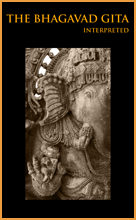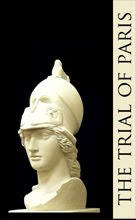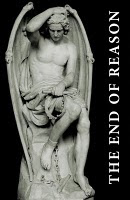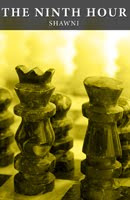I lingered in thought throughout the night. I was troubled by the conversation between al-Ganas and al-Doushu, whose arguments I have already recounted. Though both had strong and valid points, it seemed to me that both could not be correct. I believed in God, yet acknowledged the value and achievements of the sciences exactly as al-Ganas described them. I felt that al-Ganas’ argument, which was in agreement with the world as I perceived it, was superior to al-Doushu’s. I wondered if I could embrace al-Ganas’ view and yet remain faithful to my religion. As the moon set, and as dawn alighted softly in the east, my thoughts turned to Hypatia. I concluded religion and science had no concourse together; and I was on this account disturbed.
I returned to the walled garden, not having slept, and sat near a fountain whose waters glowed with the reflection of the sky’s morning colors.
As I sat, listening to the flowing waters, I saw Böethius, a master of learning no less than al-Doushu and al-Ganas, enter the garden. In his hands he held a book that had stamped on its cover a golden nine-pointed star. I greeted him. He sat near me and opened his mouth, saying:
“When you’ve arrived at the end of reason, as at the end of a road, you’ve reached your destination. There is no more road to take, nor anywhere better to go. You’ve attained your goal.”
I said, “I don’t understand.”
He smiled patiently and said, “I have in my possession something to ease your mind; something to allay your troubles, and a way out of false choices.” He then held out the book he carried, handing it to me.
“Do you recognize this book?”
I took the book from him, saying, “I don’t.”
He said, “But you see it clearly enough. You feel the heft of it in your hands, smell the scent of leather and ancient pages. You know it’s real, that it exists as surely as the hands in which you hold it.”
He said, “Then describe it for me. You know something of how books are made. Describe it.”
I nodded and turned the book over in my hands, opened the cover, flipped through the thick pages. The paper was heavy, printed on both sides with black ink. The edges of the paper were gilded. The leather cover, stamped with its golden star, was sewn delicately to the folios. These things I described, and other details more minute. When I had finished, I handed the book back to him.
Böethius smiled. He said, “You have fully described the craft, the artistry, and the materials of this book. Having done so, now tell what the book is about.
I answered, “I didn’t read the work, nor do more than glance at the title.”
He said, “Then what purpose does this craft serve?”
I said, “Just as a frame holds its painting, this book holds its words. It is a beautiful presentation; a pleasing form by which the words are suspended and preserved.”
He said, “What does the author say about the paper, printing, and binding of this book.”
I said, “I haven’t read the book, as I said.”
He said, “But you might conjecture.”
I said, “I doubt very much he says anything about it. The writing of the book surely preceded its manufacture. And most authors, while interested in the form in which their books are published, rarely think of the process when writing.”
He said, “Yes. I have read this book and nowhere do the author’s words reveal anything about the artistry and craft of building the book in which these words reside. Nowhere does he speak of gilding, or leather, or stamping or binding. The author has explained the origin of the work, even the moment he decided to write it, but nowhere does this align with its physical manufacture. If he discusses other books, still he does not describe this one. So is it fair to conclude that the artistry and craft of creating the physical book and the author’s art in writing it, barely align?”
I answered, “Yes, this is so. But these are different spheres; the writer of the book and the one who manufactures the book have different objectives. The manufacturer seeks to build the book’s physical manifestation; this is not often the author’s objective in writing the book.”
Böethius said, “Ah, but the book containing the author’s words must be bound, or the author’s purpose fails. Yet you are right; these are different spheres, even if the author and the binder are the same person, even if the author directs the form the physical book will take. Still these spheres, the book I’m holding and the words it contains, are inextricably linked together.”
I said, “This is indisputable.”
“So would you agree that the words of the book inhabit the book’s physical form and, in fact, the physical form itself was created solely to cradle those words?”
I said, “I would completely agree.”
“And further, would you agree that the words of the book transcend the book’s purely physical construction?”
I answered: “Of course. The book may be a treatise on geometry, on the movement of the heavens, on the depth of the seas, or a history of a people. Reading it, I may be transported to a thousand places in ages past or yet to come. But the physical form of the book itself cannot convey me anywhere or describe anything to me.”
Böethius said, “The book in my hands would not exist except that the words appear within it. If the words were not written, the book is not produced, though you may have at hand all the materials and the technology to construct it. It can never serve its true purpose except that words alight within it. It is equally true to say that a painting is exalted above, indeed wholly transcends, the canvas on which it is presented and the frame in which it is hung. The frame does not serve a purpose if the canvas is blank. In truth, in either case, the reading of the words or the appreciation of the painting are superior forms of knowledge than the craft of the binding, however beautifully made, or the woodwork in the frame, however expertly carved. The words, or the painted scene, when comprehended, wholly transcend the book or the canvas and frame upon which they are presented. Likewise, God’s word is both immanent in the world, yet transcends the world utterly.
“Those who describe the universe mechanically are not mistaken in their conclusions. Yet if they say that within the creation, ‘God’ is not a necessary explanation, then they have overstepped their expertise. They have described the frame, even the texture of the canvas, and the chemical composition of the paints, yet deny the painting. They weigh the book in their hands, denying the words, even as they detail the ink used to print them.
“When you described the book to me, everything you said about the artistry and craft that went into the manufacture of this object was true, based on observation, experience, and by weighing it in your hands. You may know every physical aspect of the book, yet you may have no knowledge of why it was called into being; you may be completely ignorant of the reasons why it was written. You can only possess such knowledge when you have read the book. In the words are mysteries of the author’s mind, the very contents of a mind that transcends the book and cannot be grasped by merely describing and explaining the book’s physical attributes. Inextricably linked, still knowledge of the characteristics of the book and knowledge of the words and the author’s intent are different kinds of knowledge completely. Would you agree then that these two aspects of this book are separate spheres of knowledge?
I said, “Yes, I cannot disagree.”
“Then you understand what neither al-Ganas nor al-Doushu understand. Science and faith may be reconciled as the moon may be reconciled with the sun. These are different spheres, made of different matter, serving different purposes. That the moon sometimes eclipses the sun is no testament to the moon’s greater size; it only seems so because the moon is so close, so immediate to us. It is in fact the sun that is of greater size, which transcends the bond between earth and moon, yet whose light and heat are everywhere present. But the sun and the moon are not in conflict; they are in perfect accord with the purpose of the heavens. They do not war with one another; one does not dispute the other. And one may even declare that in the light of the moon you see the very proof of the sun. So whether science explicitly confirms the bond between God and creation, or merely implies it, these are ways of knowing that enhance the other.
“Calligraphy is lovely scribbling without meaning, except as the means by which the words are made evident. The ink does not prove the words, or their truth. But without it, the words cannot be revealed. Likewise, the physical characteristics of creation are the means through which Truth is ultimately revealed to men.
“When I first handed you the book, what did I say?”
I replied, “You said that I felt the weight of it, that I could catch the fragrance of leather and old paper, that I knew the book was as real as I am, real without doubt.”
Boëthius said, “Yes. But now you know what is more real than that; the words within the text gave existence to the book’s physical form and did more than that. Those words gave the book a reason to exist at all. The author inscribed in this book the letters B and E. And therefore it came into being.”








